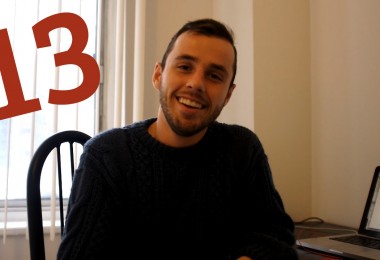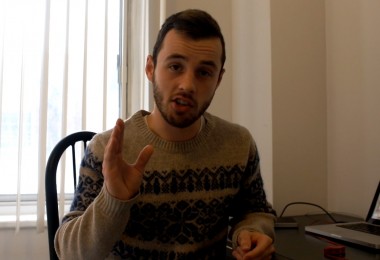The fear of public speaking is one of the biggest fears in the world.
In surveys, it’s usually near the top of the list. Often, it’s above the fear of death, spiders, snakes, heights, or flying.
That’s right. Many people would rather babysit a snake or jump out of an airplane than make a ten minute speech.
Now… if that’s how afraid NORMAL people are of public speaking, then can you imagine what shy and SOCIALLY ANXIOUS people have to face?
From personal experience, I can tell you that having social anxiety makes talking in front of a large group of people about 100 times worse.
I Know Because I’ve Been There
If there was one thing I hated in elementary and high school days, it was public speaking. I remember I would have done anything to get out of making speeches and presentations in front of the class.
The only reason I did them was because I was even more afraid of my parents finding out if I didn’t. So I ended up always forcing myself to go up and talk even though I felt like I was going to die inside.
And I would dread the presentation or speech for weeks in advance. Whenever I thought about it I would suddenly get a surge of anxiety imagining all those eyes on me and me being the center of everyone’s attention.
When the time came to finally make the presentation, I would be a nervous wreck. I’d get up there, look down at my cue cards as much as possible, and speak as quickly as I could. Even though I tried to talk normally, my voice always seemed to sound weird and the teacher would always write that I was too “quiet” or “soft spoken” or “nervous” on the evaluation sheet.
Once the presentation was over, I was just glad to get back to my seat as fast as possible and have it be over already. I was always completely shaken up and agitated, but relieved, once the whole experience was behind me.
I would be relieved for a few day, weeks or months, but it didn’t last forever. Eventually the teacher would assign a new project that involved public speaking, and the cycle of anxiety and dread would start up again.
And the worst part is, my fear of public speaking didn’t seem to go away over time, it just seemed to get worse. Even as I went through the later part of high school and after I graduated.
I only started to get better at public speaking when I decided to learn specific techniques to overcome my fears and anxiety. I’ll share with you a few of these in this article.
1. Exposure Is The Way To Go
In order to overcome your anxiety and fear of public speaking, you’re going to have to do it. Over and over again. Even if you are afraid.
That’s the harsh reality, and anyone who claims otherwise is probably trying to sell you something.
Progressive exposure is the most effective and scientifically proven way for most people to get over their fears. This means you set up opportunities to slowly desensitize yourself to talking to people. The basic approach to overcoming fear is this: slow, steady improvement and putting yourself into uncomfortable situations.
Be afraid, be nervous, be hesitant, but do it anyway.
One way to gain exposure that’s often recommended is to sign up for Toastmasters International. Toastmasters is an organization that has groups that meet up in most major cities all over the world. Every week, one or more people in the group make a presentation/speech.
Of course, if you have severe social anxiety, then the idea of Toastmasters probably makes you want to hide under your bed. That’s why I say that PROGRESSIVE and GRADUAL exposure is the key here. First practice talking to people on-on-one, then, when you’re confident with that, then go for the big leagues with Toastmasters.
I know this piece of advice doesn’t help you if you have a presentation tomorrow, but it’s very important to follow it if you want to get better in the long run. If you want to get over your fear of public speaking permanently, then exposure is an absolutely necessary part of the plan.
Overcoming social fears is a long-term goal. Don’t expect to totally eliminate your fears and not feel anxious right away, but if you start doing things in spite of the fear, then you will amaze yourself with the progress you make.
Of course, I said a couple minutes ago that my public speaking just got worse over time, even with exposure. So why do I recommend it now?
The short answer is that I don’t recommend exposure by itself. By itself exposure will give you some progress, but not much. But if you combine exposure with other techniques for coping with anxiety, as well as practicing the tips I share with you in this article, then your fear will decrease until it is basically gone.
2. Repeated Practice Creates Confidence
The confidence that a polished public speaker possesses comes from making thousands of presentations and realizing that no single presentation has any lasting consequence on their life. This makes them able to express themselves freely and let go of the stress and anxiety most people feel.

Think about it. Why do most people fear public speaking? Because they think there’s a good chance they’ll “mess up” and look foolish. Even more importantly, they believe the CONSEQUENCES of messing up and looking foolish are very big. If they mess up, they feel like the sky will come crashing down. Nobody will ever like them again. The universe will end.
And the solution to this problem is not to tell yourself “What’s the worst that can happen?” but to go out and prove to yourself through firsthand experience that you will live regardless of how well you make your speech or presentation.
As a side note, the reason people feel fear is because a small part of your mind that triggers fear (the amygdala) thinks that public speaking is a threat to your survival. It sounds bizarre, but when you feel fear, it basically means your mind thinks there is a chance you will die. So the solution is to keep exposing yourself to public speaking to show the “fear trigger” in your mind that it doesn’t kill you. Once you do this enough times, you will basically re-wire that “fear trigger” and not feel fear anymore about public speaking.
Once you start regularly making public speeches and presentations, your brain will slowly realize that there really are no permanent effects on your life, even if you screw up bad. You realize that people forget about your speech within a day or two, maybe even an hour or two. People are way to concerned with their own lives and issues to worry about that one time you made a fool of yourself.
3. Breathe and Relax
The mind and body are interconnected.
If your mind is anxious, your body will start to shake and sweat. You won’t be able to breathe or talk normally.
However, the opposite is also true. If you can make your body calm and relaxed, your mind will follow. It will become less anxious and you will feel less fear if you are relaxed “on the outside.”
Instead of repeating what I’ve said in the past in this article, simply click here to learn two excellent techniques for reducing anxiety and tension that work almost instantly.
4. Let Go Of Control
When you go up in front of a group of people, do you immediately become self-conscious and inhibited?
The reason why this happens is because you are trying far too hard to control the impression you make on people. Once you get up in front of a group of people, everything you do becomes calculated and measured. Every word you say is chosen carefully, every gesture looks painfully contrived.
You do this to try to avoid making yourself look stupid. You’re trying to avoid disapproval. Unfortunately, trying to monitor and control every little word you say and action you take actually makes you look a lot worse than if you were just acting naturally.
The solution is to let go of trying to control every little word and action. You can do this by changing your focus. Instead of focusing on what specific words to say or how to stand, focus on the message you want to convey to your audience. What do you want them to get out of it?
And yes, this is definitely easier said than done. Especially for someone who is so shy or socially anxious that they are self-conscious talking to even just one person.
But training your focus like this is a skill that is learnable. And it is essential to learn it if you want to start overcoming any self-consciousness you have in front of groups of people.
I’ll explain more about “how” to do this in the next two points…
5. Focus On The Message
You have to focus on the message and emotions you want to communicate and not worry about controlling the individual words. Trust that when your focus is on conveying the right message, the words will come out automatically and the gestures will choose themselves.
But in order to accomplish this, in order to become spontaneous and “natural” as opposed to self-conscious and studied in your performance, you will have to give up some control.
If you want to talk naturally instead of self consciously when public speaking, then you will have to let go of needing every word to be perfectly planned out. All you should control is the “intent” you have behind your words and actions, not the words and actions themselves.
Any good performer does this, from top public speakers to world-class pianists.
The most skilled pianist in the world could never play a simple composition if he tried to consciously think out just which finger should strike each key – while he was playing. He was able to become a skilled performer only when he reached the point where he could cease conscious effort and turn the matter of playing over to the unconscious and automatic part of his mind.
– Dr. Maxwell Maltz
Anytime you are feeling self-conscious, it is because you are trying to control how you come across too much. When you are just talking to a family member, you don’t really care if every word is perfect. You have a general idea of what you want to say, and then you just talk.
It’s only when you go up in front of a group of people that you start to carefully pick out the exact words to say and carefully control your body language. And this is what makes you self-conscious.
Look at any videos of top public speakers. Do they look like they are preoccupied with presenting themselves a certain way? No. If they were, they could never put so much energy and charisma into their speaking. When they are at their best, their focus is always 100% on trying to get their intended message across.
6. No Internal Dialogue
One practical way to stop monitoring and controlling your behavior is to stop talking to yourself. You should have no internal dialogue when you are doing public speaking.
If you are talking to yourself, then that inner voice is probably talking about what to say/do next, or it’s commenting on how well you’re doing. Neither help you.
The best public speakers, believe it or not, just say the first thing that pops into their head. They don’t even think about it, they just say it. Their presentations are actually just a big stream-of-consciousness. But since their focus is on conveying the right message, everything works out.
By simply expressing what comes into your head instead of trying to filter and control what you say, your speaking will actually be a lot clearer. This is because you won’t have that “filter” of thinking and self-consciousness muddying up the channel of communication between you and your audience.
People don’t really care about the individual words anyway, but they will be able to FEEL your message if you implement what I’m saying here. To get an example of what I mean, watch this video of Tony Robbins in action…
7. People Don’t Expect Perfection or Brilliance
Many people will tell you that you don’t need to be perfect and flawless when you do public speaking. Not only does this advice help to lower your fear and anxiety, but it’s also true.
Think about what the goal of your speech or presentation really is. The goal of your speaking is not for you to appear flawless, intelligent, or charismatic. The real goal of any public speaking may be to teach people something, to entertain them, or to make them interested about a topic.
Even if these weren’t your goal before, they are now. Don’t view success as making other people think you are perfect or brilliant. Think of success as giving something to other people. If you’ve just given your audience something of value, whether that be a single insight or piece of information they didn’t know before, you’ve succeeded.
The essence of public speaking is this: give your audience something of value. That’s all there is to it. If people in your audience walk away with something (anything) of value, they will consider you a success. If they walk away feeling better about themselves, feeling better about some job they have to do, they will consider you a success. If they walk away feeling happy or entertained, they will consider their time with you worthwhile.
Even if you pass out, get tongue-tied, or say something stupid during your talk . . . they won’t care! As long as they get something of value, they will be thankful.
-Morton C. Ormond, MD
If you’ve ever heard the advice people give to shy people to “focus more on other people and less on yourself,” this is why. Once you view success as giving something valuable to your audience instead of trying to make them like you, much of the anxiety goes away.
8. Keep Your Focus On The Present Moment
When you are making a speech or presentation, it’s very important to keep your attention in the present. Stay focused on what is happening RIGHT HERE, RIGHT NOW.
If you are thinking about something that happened 2 minutes or even 20 seconds ago, then you are not able to focus on the only place where your actions can make a difference, which is the present. It makes no sense to worry about some blunder or mistake you made while you are still speaking.
You canʼt affect the past or the future. I remember when I was learning to play a new instrument a friend said: “If you mess up or play the wrong note, forget about it! Itʼs done man, you canʼt go back to that. The river keeps flowing. Stay in the present!”
This is exactly the mindset you must be in when you are doing public speaking. If you mess up, donʼt think about it! Bring your attention back to what is happening right now, not what happened a couple minutes ago.
And don’t think too far ahead, either. If you start worrying about something a few minutes into the future, then there’s no way you will be able to effectively convey your message. You’ll be too distracted and scattered all over the place. You’ll be too preoccupied and anxious about remembering some point you need to make in a few minutes.
STOP thinking so much and breathe. Bring your focus back to the present and keep it here.
Summary
In short, here are the 8 steps:
- Expose yourself to your fears in order to overcome them.
- Repeated practice creates confidence.
- Breathe and relax.
- Let go trying to control how you come across.
- Focus on the message you want to communicate.
- Don’t talk to yourself.
- People don’t expect perfection or brilliance.
- Keep your focus on the present moment.
Remember that overcoming any fear takes time and effort. But it is possible to desensitize yourself to the fear of public speaking, learn to avoid the mistakes you’ve made in the past, and become an effective and relaxed public speaker.
You can become someone who doesn’t feel dread and anxiety before stepping up to do public speaking. Who doesn’t become a shaking, stuttering mess once the pressure of dozens of eyes are on you.
All you have to do is take one of the ideas I’ve shown you in this article, and implement it the next time you speak. Then after that try a second one. Once you have a few of these down and some experience under your belt, your fear of public speaking will decrease dramatically. Keep practicing and one day it won’t bother you at all.
If you want to learn more tips on how to be less shy, anxious and introverted in social situations, then click here to check out my ebook on overcoming shyness and social anxiety.






Thanks for the valuable information about how to speak in public. I’ve suffered with social anxiety and fear of public speaking since I was a kid. I’ve decided it’s better to face this and learn how to be less anxious than try and avoid everything. You’ve got good stuff here and on your website!
Thanks for the tips to be a effective speaker and sound better. Its all common sense and most of the time we get lost in mundane activities, we forget the basics. I have been working on the above suggestions now and I have found that it makes a lot of sense. Especially the two techniques for “Coping with Social anxiety” are very powerful. Appreciate your efforts to publish this.